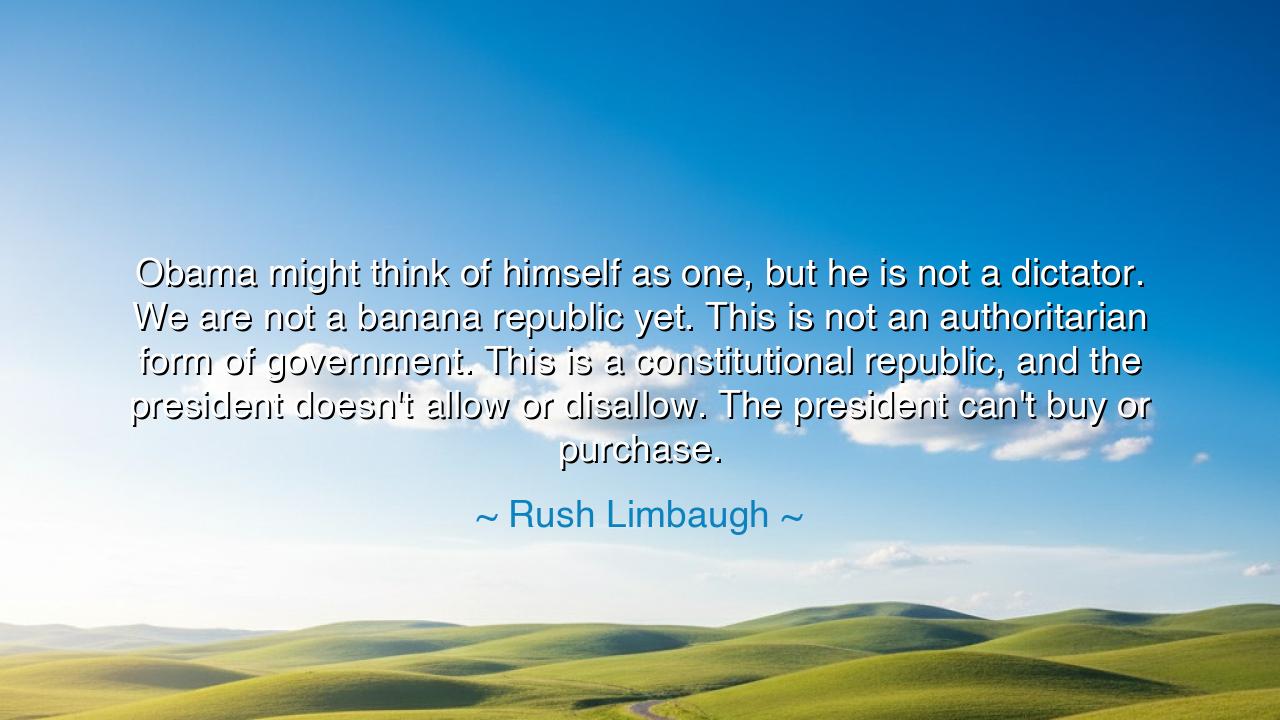
Obama might think of himself as one, but he is not a dictator. We
Obama might think of himself as one, but he is not a dictator. We are not a banana republic yet. This is not an authoritarian form of government. This is a constitutional republic, and the president doesn't allow or disallow. The president can't buy or purchase.






The voice of Rush Limbaugh, ever fiery and unyielding, once thundered these words: “Obama might think of himself as one, but he is not a dictator. We are not a banana republic yet. This is not an authoritarian form of government. This is a constitutional republic, and the president doesn’t allow or disallow. The president can’t buy or purchase.” Though uttered in the heat of political debate, these words echo with an ancient truth that transcends the names and ages of men. Beneath the sharpness of tone lies a solemn warning — that the power of a republic is sacred, and its preservation depends on the unbroken boundaries of law. In this statement, Limbaugh, like a sentinel on the walls of liberty, reminds the people that even the most charismatic leader must kneel before the Constitution, and that freedom endures only when authority is restrained by principle.
To understand the meaning of this quote, one must strip away its momentary context and hear its timeless message. Limbaugh is not merely criticizing a man, but defending a system — the system of constitutional government that was built to resist the tyranny of any single will. His insistence that “the president doesn’t allow or disallow” and “can’t buy or purchase” speaks to the foundation of the American ideal: that the ruler is bound by the law, not the law by the ruler. When the machinery of government begins to move according to the whims of one individual, however noble his intentions, the delicate balance of liberty trembles. Thus, Limbaugh’s declaration is both rebuke and remembrance — a call to recall that no nation remains free where power ceases to be limited.
The origin of such sentiment lies deep in the American soul, forged by revolution and tempered by wisdom. The Founding Fathers, having thrown off the yoke of monarchy, feared above all the rise of unchecked power. They built a republic, not a monarchy, not a mob-rule democracy, but a system of laws and separated powers designed to restrain human ambition. George Washington himself, though revered as the father of the nation, refused the temptation of kingship, declaring that no man should wield authority beyond the consent of the people. Limbaugh’s words, though born centuries later, are but an echo of that founding oath — a reminder that America must never forget what it was built to resist: the slow, seductive drift toward authoritarianism.
History has shown, in every age, what becomes of nations that forget this truth. Consider the fate of the Roman Republic, once the beacon of law and civic virtue. It began as a constitutional system with elected magistrates and a Senate bound by tradition and duty. Yet over time, ambition corrupted its heart. The people, weary of political conflict and hungry for stability, surrendered their freedom to the will of one man — Julius Caesar. His rise marked the death of the republic and the birth of empire. What followed was tyranny cloaked in splendor, and liberty drowned beneath the applause of the crowd. Limbaugh’s warning, like that of the Roman statesmen before the fall, is this: when citizens forget that their leaders are servants of law, they soon find themselves subjects of power.
In his mention of a “banana republic,” Limbaugh invokes a vivid image — nations where corruption, military force, and personal rule replace law and order. Such governments do not fall overnight; they rot gradually, as institutions weaken and the people grow indifferent. The danger he points to is not merely political — it is moral. When citizens begin to see government as the instrument of men rather than the guardian of law, they surrender the virtue that sustains freedom. A constitutional republic lives not only in parchment and parchment seals, but in the hearts of those who insist that no man, however great, stands above the law.
The lesson of this quote is eternal and weighty: liberty requires vigilance. It is not enough to love freedom; one must also defend the laws that protect it from the grasp of power. Every generation must ask itself whether it honors the structure that guards its rights — the Constitution, the separation of powers, the rule of law. For when citizens cease to care, or when they excuse the bending of law for the sake of convenience or partisanship, they open the gates to despotism. The republic dies not in one great blow, but in a thousand quiet compromises of principle.
And so, my child, remember this teaching: governments are mortal, but principles endure. Do not measure freedom by the face of a leader, but by the integrity of the system that restrains him. Respect authority, but question it; trust institutions, but guard them. Speak when others are silent, and stand when others bow. For the moment a nation forgets that its leaders are servants — not masters — it ceases to be a republic and becomes a kingdom once more. Let your loyalty be not to men, but to truth, justice, and the Constitution, and your country will remain forever free.






AAdministratorAdministrator
Welcome, honored guests. Please leave a comment, we will respond soon